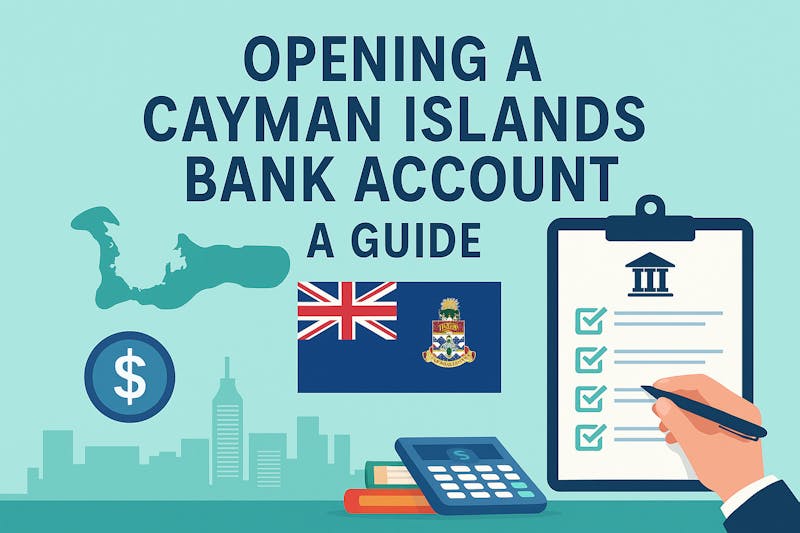The Cayman Islands offers a well-regulated banking system with global reach and no direct taxes on income, corporate profits, capital gains, or inheritance. Government revenue mainly comes from fees and import duties.
Clients can access banking, investment, trust, insurance, and corporate services through both local and international banks regulated by the Cayman Islands Monetary Authority (CIMA)
Expect risk-based customer due diligence (CDD), enhanced due diligence (EDD) for politically exposed persons (PEPs), and full source-of-funds and source-of-wealth verification under the Anti-Money Laundering Regulations (2025 Revision). Some banks allow remote video interviews, though many still prefer certified or in-person onboarding.
Policies vary by bank. Minimum deposits and account types differ, so always confirm current requirements before applying.
Opening a bank account in the Cayman Islands can be challenging without familiarity with local rules. Known for its strong financial sector and tax-neutral environment, Cayman remains a top choice for cross-border business and private banking.
Cayman Islands as a Financial Hub
The Cayman Islands is a leading international financial center for banking, funds, structured finance, and captive insurance. It attracts global investors for several reasons:
- A tax-neutral system and common-law legal framework that support cross-border transactions.
- A deep financial services ecosystem regulated by CIMA across banking, insurance, investment management, and securities business.
- 84 licensed banks as of August 2025 (11 Class A and 73 Class B), compared with 86 banks in March 2024.
- 122,733 active companies (Q2 2025) recorded by the General Registry.
- Virtual Asset (Service Providers) Act – Phase 2, effective 1 April 2025, introduced stronger prudential and reporting standards and requires at least three directors, including one independent director, for licensed VASPs.
- Beneficial Ownership Transparency Act (BOTA) is in force; since February–April 2025, Legitimate Interest Access rules allow qualified applicants to request beneficial ownership data via the competent authority. The register is not public.
While Cayman offers flexibility and stability, non-residents must meet strict compliance standards to open or maintain accounts.
Why Open a Bank Account in the Cayman Islands
The Cayman Islands is known as one of the most secure and trusted offshore financial centers in the world.
Financial Privacy
Cayman banks observe strict confidentiality, balanced against BOTA, AML laws, and international transparency regimes (FATCA, CRS, etc.).
Beneficial ownership data is restricted—only accessible to authorities and legitimate-interest applicants who pass screening.
Asset Protection
Many clients set up Cayman companies, trusts, LLCs, captives, and segregated portfolio companies for asset protection, estate planning, and legal isolation.
The captive insurance sector alone is massive: Cayman has hundreds of captive insurers writing billions in premiums.
Tax Advantages
There is no corporate income tax, personal income tax, or withholding tax on most interest and dividends, maintaining Cayman’s tax-neutral status for international investors.
Comprehensive Financial Services
Cayman’s banks and service providers offer banking, wealth management, fiduciary, fund administration, and insurance solutions, all supervised under updated CIMA Regulatory Handbook (Vol. 1, June 2025).
Stable Political and Economic Climate
As a British Overseas Territory, Cayman benefits from a strong rule-of-law system and diversified economy supported by financial and tourism sectors.
If you also need a Cayman company, Air Corporate can coordinate incorporation and prepare a bank-ready KYC and beneficial ownership pack to speed up onboarding.
Potential Drawbacks
- Lack of deposit guarantee: Cayman has no formal deposit insurance scheme. Instead, in a liquidation, depositors with KYD 20,000 or less get preference status (i.e., first in line), but recovery beyond that is uncertain.
- High costs and minimums: Many banks require large opening deposits (tens or hundreds of thousands USD/KYD) and steep ongoing fees.
- Strict compliance and rejection risk: Non-residents often face high scrutiny; lacking a “tie” to Cayman can lead to application rejection.
- Exposure to natural disasters: Being in the Caribbean, hurricanes are possible. Make sure your bank has strong continuity/disaster recovery plans.
- Reputational and regulatory risk: Offshore jurisdictions attract regulatory scrutiny; changes in AML, tax, or disclosure laws (in Cayman or in your home country) can affect your structuring.
- Exchange and currency constraints: The local currency is Cayman Islands Dollar (KYD), pegged to USD at 1 KYD = 1.20 USD. Many accounts are maintained in USD or other major currencies.
- Foreign tax regimes and reporting burdens: If you’re a U.S. or EU taxpayer, you’ll be subject to FATCA, CRS, FBAR, or similar regulations. Cayman is transparent with international information exchanges.
How to Open a Bank Account in the Cayman Islands
Opening a bank account in the Cayman Islands may be more complex than in some other places, but following the correct steps can help set a business up for success.
Step 1: Select the Right Bank
Compare services, currencies, and online features. Examples include:
- Butterfield Bank — retail, private, and corporate banking with extensive ATM network.
- Cayman National Bank — widest ATM network across all three islands.
- PROVEN Bank (Cayman) — formerly Fidelity Bank (Cayman); acquisition completed 2022.
- Scotiabank Cayman — recognized in Global Finance 2024 for consumer digital banking.
- RBC Royal Bank (Cayman) — offering retail and wealth-management services.
Step 2: Choose the Account Type
Decide whether you need an individual (personal), corporate, trust, investment, or multi-currency account.
Next, verify whether the bank accepts non-resident clients, what account tiers are available, and what currencies are supported (KYD, USD, EUR, GBP, etc.).
Step 3: Prepare the Required Documents
For Individuals (Non-Residents)
- Passport + second photo ID
- Proof of residential address (within 3 months)
- Bank or professional reference
- Source-of-funds and source-of-wealth documents
- Initial deposit (varies by bank)
- Certified or notarized copies; some banks may require a video or in-person interview
For Companies
- Certificate of Incorporation and constitutional documents
- Registers of directors and shareholders
- Beneficial ownership details (per BOTA)
- Board resolution authorizing account opening
- Business plan and transaction profile
- KYC documents for directors, UBOs, and signatories
Air Corporate prepares CIMA-compliant KYC packs matching bank onboarding checklists.
Step 4: Apply Remotely or In Person
Submit your documents (originals or certified), attend any interviews (in person or via video), and complete bank’s internal compliance reviews.
Be responsive to additional requests: banks often ask follow-up for clarifications, supplementary proof, or background on fund sources.
Step 5: Fund and Activate
Make the initial deposit (varies by bank; often substantial)
Setup e-banking, security tokens / 2FA, define account users, card issuance, wire instructions
Confirm tariff schedules (FX, wires, account maintenance, checkbooks)
2025 Compliance and Regulatory Notes
AML / KYC Landscape
- The Anti-Money Laundering Regulations (2025 Revision) govern CDD, EDD, record-keeping, reporting, and suspicious transaction obligations.
- Banks follow a risk-based approach; clients with complex structures or cross-border flows may face elevated scrutiny.
- CIMA issues Guidance Notes (e.g. Feb 2024 version) to supplement statutory rules.
Beneficial Ownership and Transparency
- Under Beneficial Ownership Transparency Act (BOTA), beneficial ownership information must be maintained accurately and submitted to competent authority.
- Legitimate Interest Access allows vetted individuals/entities to request BO data; public browse is not permitted.
Virtual Asset Providers (VASP)
- From 1 April 2025, Cayman’s VASP Phase 2 rules require licensing, governance (incl. one independent director), capital/operational controls, and stronger reporting obligations.
Deposit Preference in Liquidation
- If a Cayman bank is wound up, depositors with KYD 20,000 or less enjoy preferential status (i.e. paid first) over general creditors—but that is not a guaranteed insurance scheme.
- Larger depositors (> KYD 20,000) may recover some or none depending on the bank’s residual assets.
Cayman has no deposit insurance. Instead, in a liquidation, depositors with KYD 20,000 or less enjoy a preferential claim under the Companies Winding-Up Rules (2023).
Enforcement and Compliance Oversight
- CIMA actively enforces rules; in 2025, it issued Warning Notices for breaches under the Securities Investment Business Act and other statutes.
- Banks must maintain adequate capital, internal controls, audit, compliance functions, and risk management to satisfy CIMA inspections.
CIMA’s Strategic Direction
- The 2024–2026 Strategic Plan outlines enhancements in digital supervision, regulatory sophistication, and alignment with global standards.
- The fact sheet confirms CIMA’s mission to protect integrity and supervise financial services activity.
International Cooperation and Information Exchange
- Cayman is fully engaged in CRS, FATCA, and global AML frameworks: banks are mandated to report to relevant tax authorities when required.
- CIMA has memorandums of understanding (MoUs) with many foreign regulators and participates in cross-border supervisory cooperation.
If you want an end-to-end setup, Air Corporate can coordinate offshore company formation, prepare beneficial ownership and AML/KYC packs, and liaise with banks for you.
FAQs
The official currency is the Cayman Islands Dollar (KYD), pegged at a fixed rate of 1 KYD = 1.20 USD. Both KYD and U.S. dollars are commonly accepted. If you bring CI$ 10,000 (about USD 12,000) or more in cash or bearer instruments, you must declare it to Customs & Border Control on arrival or departure.
The total cost depends on the bank and account type. Most banks require minimum opening deposits ranging from USD 10,000 to 100,000 for personal accounts and higher for corporate clients. Fees vary by currency (KYD, USD, CAD, GBP are common).
Yes, it is legal to have a bank account in the Cayman Islands. Individuals and companies must comply with Anti-Money Laundering (AML) and Know-Your-Customer (KYC) rules, and international reporting frameworks such as FATCA and CRS.
People open Cayman Islands bank accounts for asset diversification, wealth management, confidentiality, and access to global financial services. The jurisdiction is politically stable, has strong regulation, and levies no direct taxes on income, capital gains, or inheritance.
The top banks in the Cayman Islands include Cayman National Bank, Butterfield Bank, RBC Royal Bank (Cayman), Scotiabank Cayman, and PROVEN Bank (Cayman). Each offers personal, business, and investment services. The best option depends on your residency, risk profile, and financial needs.
As of mid-2025, banks licensed in the Cayman Islands held roughly US $530 – 540 billion in total assets, confirming its position as one of the world’s largest offshore banking centers.





